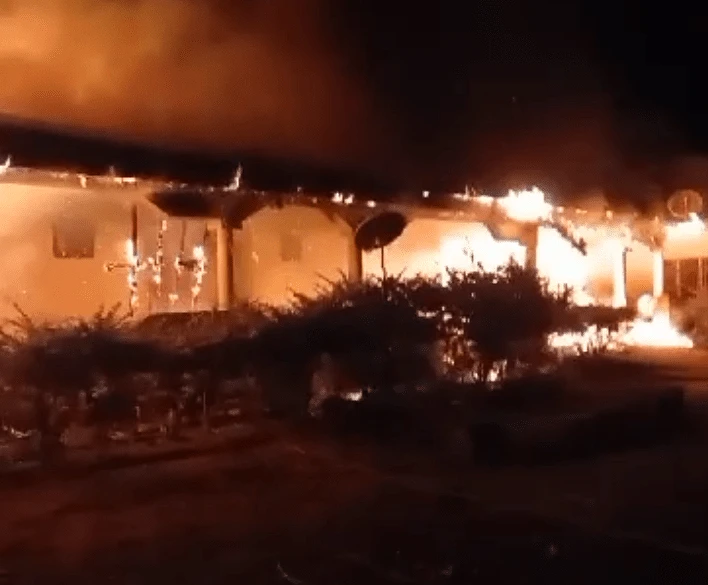
Nigeria: attacks on Christians continue unabated amid government inaction
A wave of attacks on Christian settlements in Nigeria’s Middle Belt in recent weeks show the inability or unwillingness of the new government of President Bola Tinubu to stamp out religious persecution.

Assailants set fire to the rectory of St. Raphael’s Catholic church in Fadan Kamantan on September 7. screengrab, Morning Star News
On September 7 a young Catholic seminarian was burned to death when assailants set fire to the rectory of St. Raphael’s Catholic church in Fadan Kamantan, southern Kaduna State, an area where Fulani militants operate freely. Because it was so shocking the story made headlines in the international religious press. But gruesome attacks on Christians by Islamist militants are a regular occurrence in Nigeria’s Middle Belt, and largely go unreported.
Just three days later, gunmen killed a Christian woman and wounded her husband in Jalingo, in Taraba State. The attackers injured many others and abducted six, media reported.
Also on Sunday September 10, militants killed 10 Christians in Kulben village of Plateau State, Morning Star News reported. According to a local resident, Fulani herdsmen were involved in the attack.
And on Friday September 15, in Dogon Nama, Kaduna State, 15 villagers were killed and 32 were abducted by gunmen referred to by a local resident as Fulani militants.
Failed kidnap attempt
The seminary student, Na’aman Danlami, was burned as the assailants attempted to kidnap the parish priest and his assistant, both of whom managed to escape, according to Morning Star News. Members of the clergy are often singled out as targets by terrorists.
As CSI senior researcher on Subsaharan Africa Dr. Franklyne Ogbunwezeh explains, kidnapping has developed into a lucrative sideline for jihadist groups, including Fulani militants, in Nigeria.
“Kidnapping for ransom is a source of financing for Islamist terrorists,” commented Ogbunwezeh. “They have been known to murder those whose relatives were not able to cough up the ransom for their loved ones. These senseless killings not only show their absolute disdain for Christian lives but dovetail into their overall strategy of either enslaving or killing Christians, which has been their core ideology in Nigeria since the beginning of the Islamic insurgency ushered in by Boko Haram in 2009.“
“Evil against Christians”
Rev. John Hayab, chairman of the Christian Association of Nigeria (CAN) Kaduna State Chapter, is reported as saying that in Kaduna State 23 priests have been killed in attacks in the past four years, 200 churches have been forced to close, and 115 churches have been burned down. As a result, Christians are often forced to worship in the open.
Lamenting the latest violence, Hayab accused the government of failing to protect the Christian population. “It is sad that killings and this type of evil against Christians are still going on in spite of our appeal and pleading to the Nigerian government to take measures towards ending these attacks,” Hayab said, as quoted by Morning Star News.
For his part, CAN President Daniel Okoh is quoted as stating merely that the killing of the seminarian “shows Nigeria is yet to win the war against insecurity.”
At the end of May 2023, a new president, Bola Tinubu, replaced Muhammadu Buhari, who in his eight years in office failed to prevent the spread of insecurity in Nigeria – despite this being an election promise.
Ogbunwezeh says that questions over the legitimacy of the election have dogged Tinubu – a southern Muslim – in his first months in office and distracted him from dealing with the scourge of religious and ethnic violence, which mainly affects the Middle Belt states where Christians are in the majority.
“Lacking legitimacy at home, he has been courting international recognition, leaving the government little time to settle down to the actual business of governance. This has affected his ability to deal with issues such as Christian persecution in the Middle Belt.”
But he adds that Tinubu, in the run-up to the elections, “never talked about the religious persecution of Christians, for which there is consistent evidence.”
Speaking with one voice
Church leaders in Nigeria have also tended to avoid referring to Christian persecution, despite statistics showing that thousands of Christians are killed in Nigeria every year. According to Intersociety, an NGO that collates figures on jihadist attacks, 2,500 Christians died at the hands of Islamist militants in the first six months of this year.
“Fear, lack of solidarity, and division among the various Christian denominations in Nigeria play a role here,” says Ogbunwezeh. “Until now they have not been able to speak with one voice on the issue of Christian persecution in Nigeria.”


